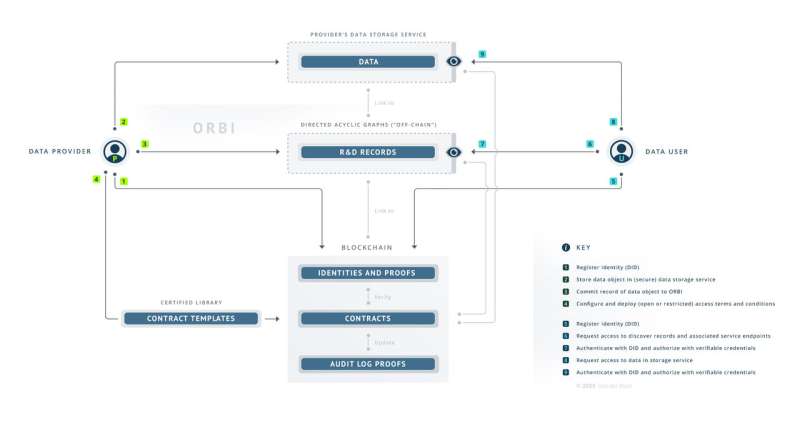Simplified visualization of elements in a possible outbreak R&D blockchain infrastructure (ORBI), with numbers and connectors indicating how sharing between a data provider and user could be coordinated. Credit: Mark B. van der Waal
A small team of researchers from Vrije Universiteit Amsterdam, the Triall Foundatio, the Netherlands National Institute for Public Health and the Environment and FutureLab has published a Policy Forum piece in the journal Science suggesting that blockchain technology could be used to protect the interests of researchers working on a cure for a pandemic. In their paper, the team suggests that blockchain technology could be used to disseminate research information in a way that protects property rights and other interests of researchers and their employers.
As the world continues to adjust to the changes the pandemic has wrought, scientists around the world are working to develop a vaccine and treatments for those infected. In many respects, the work being done by such researchers is unprecedented—teams around the globe are sharing their findings with the global community in ways never seen before, sometimes even before the results are peer reviewed or formally published. In other cases, however, dissemination of information sharing has been met with age-old hurdles—distrust, worry about patents, and how to ensure rgw profitability of discoveries—and of course, concerns over attribution. No one wants to be the person who finds a cure for COVID-19, only to have the credit stolen from them by some other researcher. In their paper, the researchers suggest a tool that could help: blockchain technology.
The authors argue that blockchain technology would allow for a decentralized repository for research data dissemination with equal access and a verifiable research trail. It would also prevent unauthorized alterations. Such technology would also allow researchers and their institutions to grant access to sensitive data only to those entities they trust. They further note that the technology has been in general use long enough to have proved itself as a trustworthy repository for sensitive information, most notably as the technology behind cryptocurrencies such as Bitcoin. They do acknowledge that the technology could not remove all barriers to the free exchange of information—some are tied to pride, market issues, or regional politics. They also note that it is also probably too late to use the technology for the current pandemic, but not to early to start planning for its use in the next.
More information: Mark B. van der Waal et al. Blockchain-facilitated sharing to advance outbreak R&D, Science (2020). DOI: 10.1126/science.aba1355
Journal information: Science
© 2020 Science X Network























